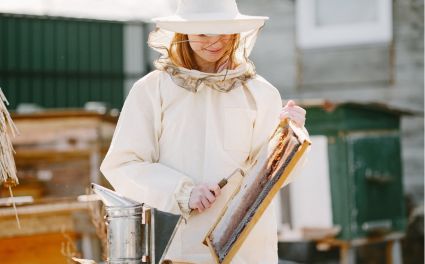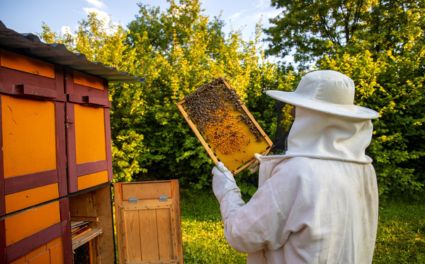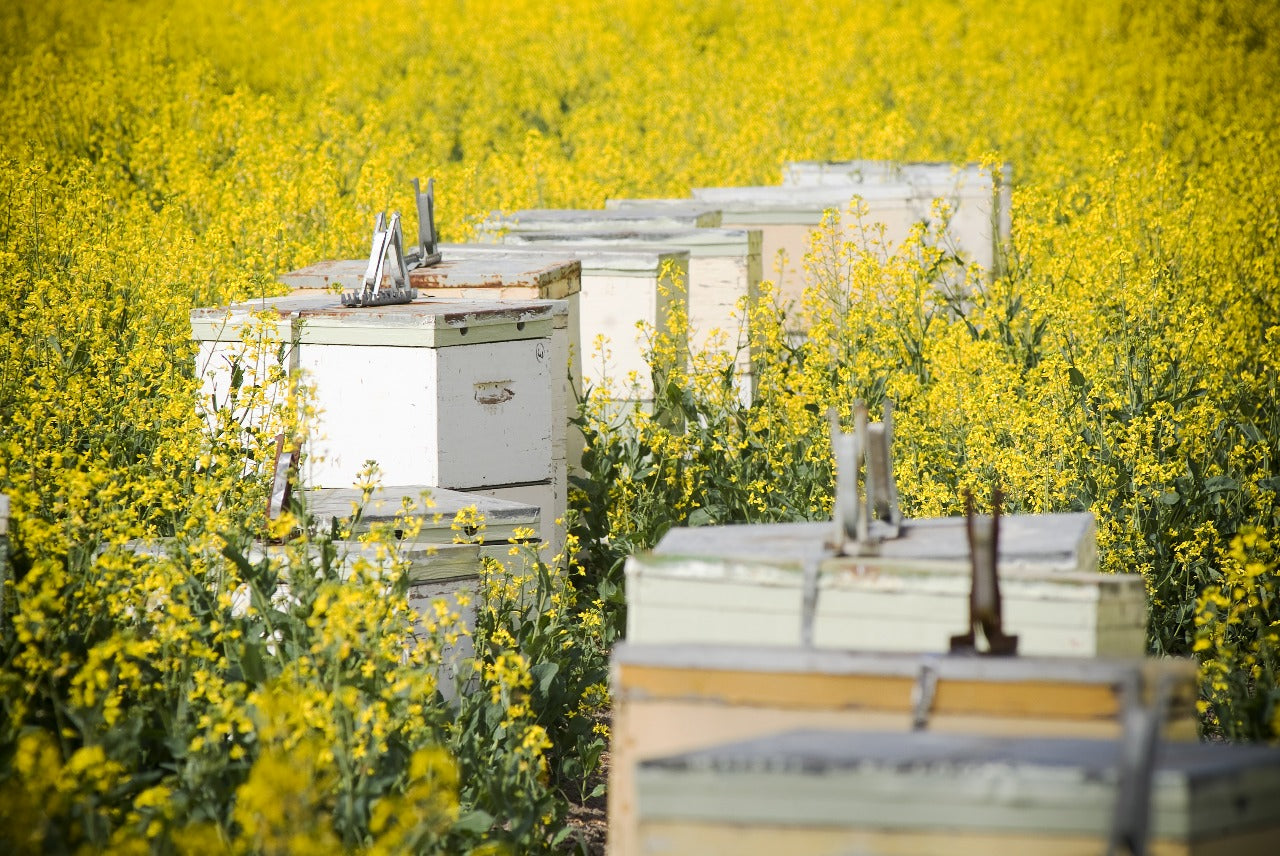Beekeeping is both rewarding and challenging. While you’ll find moments of beauty and satisfaction in the hum of your hives, it’s also an unpredictable journey. One of the most puzzling issues you might encounter is unexplained bee behavior and sudden changes in hive activity that leave you wondering what went wrong. Maybe it’s signs of stressed bee colonies or unusual patterns of hive activity, these anomalies can create a real sense of mystery.
In this post, we’ll dive into some of the most common mysteries beekeepers face, like unexplained behaviors, hive activity anomalies, the impact of weather, and even colony collapse.
Unexplained Bee Behavior: A Real Puzzle For Beekeepers
At times, bees can exhibit behavior that seems out of character. Give your bees one moment; they are busy foraging, humming with energy, and building their hive. The next moment, they’re swarming aimlessly or acting lethargic.
If you’ve ever watched your bees, wondering why they aren’t performing their usual tasks, you’ve likely encountered unexplained bee behavior.
So, what might cause this?
Colony Stress And Poor Health:
If your bees seem unusually sluggish, they might be stressed due to several factors. A stressed bee colony can exhibit decreased activity, fewer bees leaving the hive, or abnormal flight patterns. While it’s normal for some fluctuations in behavior, prolonged periods of inactivity can indicate that something is wrong.
Pest Infestations:
The presence of pests like Varroa mites can have a significant impact on hive behavior. These mites weaken the colony by feeding on bee larvae and adults, leading to reduced honey production and abnormal bee behavior.
Tools such as the Ozarmour Beekeeping Suits and Beekeeping Gloves will make sure that you can inspect your hive thoroughly and safely, without causing additional stress to the bees. By being protected from pests yourself, you can focus on removing harmful invaders from the hive.
Queen Problems:
A colony without a healthy queen will often exhibit erratic behavior. A failing queen can lead to a disorganized colony, where workers stop performing their usual tasks. If you notice a lack of brood, eggs, or strange hive activity, it's worth inspecting the queen.
Identifying Signs Of Stressed Bee Colonies
A stressed colony is one step away from becoming a weak or collapsing colony. Early detection of stress is critical for intervention. Here are some signs that indicate your bees might be under stress:
Decreased Activity:
Healthy colonies are active, with bees constantly coming and going from the hive. If you notice that your bees are hanging around the entrance without leaving, or the hive feels unusually still, stress might be to blame.
Odd Odors:
A healthy hive typically smells sweet and floral from honey and wax. If you detect a sour or musty odor, it could be a sign of disease, mold, or other forms of infection inside the hive.
No Brood:
One of the most concerning signs is the absence of a brood. Without new bees being born, the colony is headed for decline. Keep an eye on the brood pattern to make sure the queen is healthy.
Increased Aggression:
If your bees are more aggressive than usual, it might indicate that they're feeling threatened or stressed. Unprovoked stinging behavior can be a sign of hive problems, which need immediate attention.
Hive Activity Anomalies: Strange Patterns That Raise Red Flags
Beekeepers often encounter anomalies in hive behavior that are hard to explain. These deviations from the usual pattern can be indicative of underlying issues, ranging from environmental factors to health problems in the colony.
Let’s look at some of these unusual behaviors:
Winter Swarming:
Swarming is typically associated with the warmer months, but occasionally, colonies may swarm during the colder months. This is not common and could result from overcrowding, inadequate food stores, or a failing queen. If you notice a sudden increase in swarming activity in winter, it's essential to investigate immediately.
Protective gear like the Ozarmour beekeeping 3 layer mesh suit make sures you can check the hive without putting yourself at risk.
Population Decline:
A sudden and dramatic drop in bee numbers can signal that something is wrong. Whether the bees are leaving or dying unexpectedly, it could be an early sign of colony collapse.
This is a time to inspect thoroughly, and using gear like the Ozarmour ventilated jackets will keep you comfortable while you search for the cause.
Absconding:
Hive absconding is when the entire colony leaves the hive, often without warning. This can happen for many reasons, including disease, pests, or unfavorable hive conditions. Making sure that your hive is secure from predators and pests is vital.
How Does Weather Affect Bees? A Silent Force Of Nature
Weather is one of the most significant external factors influencing bee behavior. Bees are highly sensitive to environmental conditions, and temperature, humidity, and atmospheric pressure all play a role in how they act.
Let’s explore how different weather conditions affect your bees:
Cold Weather:
When temperatures drop, bees cluster inside the hive to stay warm. But long periods of cold can lead to starvation if the hive doesn’t have enough honey to sustain them.
Rain And Wind:
Wet and windy weather can prevent bees from foraging. Extended periods of bad weather might lead to food shortages, which can weaken the colony.
To avoid disturbing the hive in such conditions, use our Full-Suit, which will keep you dry while you check on your bees.
Heat Waves:
Extreme heat can be just as dangerous as cold weather for your bees. High temperatures can lead to overheating inside the hive, and bees may reduce foraging activity to avoid overexertion.
Colony Collapse: What Happens When the Hive Fails?
Colony collapse disorder is one of the most dreaded issues for beekeepers, as it results in the near-total loss of the colony. While the exact causes are still debated, it is generally believed to be the result of a combination of stress factors. These include:
Chemical Exposure:
Pesticides and chemicals are known to have a devastating effect on bees. If your hives are located near agricultural areas, take steps to ensure that your bees are not exposed to harmful chemicals.
Poor Nutrition:
Lack of diverse forage can lead to poor bee nutrition, which weakens the colony and makes it more susceptible to diseases and pests. Providing a variety of nectar sources or supplementing their diet can help keep your bees healthy.
Diseases And Pathogens:
Bee diseases such as Nosema or bacterial infections can cause significant harm to your colony. Regular inspections and good hive hygiene are essential for preventing these threats.
Vital Beekeeping Gear: Tools To Protect Your Bees And Your Safety
Navigating the mysteries of hive activity requires more than just observation it’s important to have the right tools. Ozarmour beekeeping suit is one of the best protective suits for beekeepers, delivering safety and comfort during inspections. It’s crucial to have the right tools to make sure that you can handle any situation in your bee yard.
Below is an overview of the needed gear:
- Ventilated Beekeeping Suits: These are perfect for warm climates or during long inspections. Ozarmour's ventilated suit makes sure airflow while keeping you protected.
- Protective Gloves: Ozarmour gloves are designed for both comfort and protection, allowing you to handle bees carefully while preventing stings.
- Hive Tools and Smokers: To calm the bees and make inspections easier, a smoker is an invaluable tool. Ozarmour’s beekeeping tools provide everything you need to manage your hives effectively.

Cracking The Code Of Hive Mysteries!
Beekeeping can feel like a mystery at times, especially when you’re faced with unexplained bee behavior or signs of stressed colonies. By staying vigilant, knowing what to look for, and having the right protective gear, you can make sure that your hives thrive despite the challenges they face. Keep exploring the mystery, and your bees will reward you with a healthy and productive colony.
Conclusion
Beekeeping is a rewarding yet complex journey filled with challenges and mysteries. Understanding your bees’ behavior and recognizing signs of stress or anomalies is crucial for maintaining a healthy colony. From pest infestations to environmental factors, many elements can influence hive activity. By staying observant, addressing issues promptly, and equipping yourself with the right tools like Ozarmour protective gear, you can ensure your bees thrive. Beekeeping is about learning, adapting, and caring for your colonies. Embrace the mysteries, and with vigilance and dedication, you’ll enjoy the satisfaction of a flourishing hive and the sweet rewards of your efforts.












